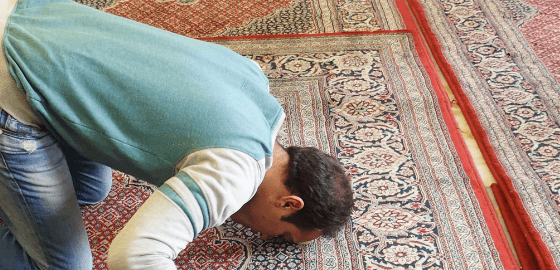Scholars differ over whether this is a Makkan or Madinan Sūrah. The majority classify it as Makkan and a few as Madinan. Some scholars argue that the first half was revealed in Makkah, while the second half was revealed in Madinah. I am inclined towards the third opinion, even though it is a minority opinion.
The reason for this is because the first half of the Sūrah clearly seems to address the Quraysh. But the second half talks about people who are lazy in the prayers and pray for show. These are the hypocrites, and they did not exist during the Makkan Era. Hypocrites only propped up during the Madinan Phase. The fact that half of Sūrah al-Māʿūn addresses the pagans of Makkah, while the other half addresses the hypocrites supports the view that it is half-Makkan and half-Madinan. Allah knows best.
The theme of Sūrah al-Māʿūn is that small acts of kindness and caring for others form fundamental parts of our religion. The religion is not restricted to theology or ritual acts of prayer. Both of these are crucial and essential. But it is also important for the believer to develop a sense of mercy for the creation, and to dedicate a part of his life to taking care of those who are less fortunate.
The Rejecters of the Religion
Allah begins the Sūrah by asking whether we had seen those who rejected the religion. This is referring to the pagans of Makkah, or the hypocrites of Madinah, according to different interpretations. Either way, Allah is drawing our attention to some of the qualities of the rejecters of the truth.
But then the qualities He uses to describe them are not the ones people generally expect. He does not describe them as those who lie against God or don’t pray. These descriptions can be found elsewhere in the Quran. These verses draw our attention to another quality of the disbelievers; apathy towards the poor.
Allah describes these rejecters as people who mistreat orphans and discourage feeding the poor. These points drive home the fact that Islam is a social religion. Our religion focuses not only on our relationship with the Creator but also on our relationship with each other. The believers are one brotherhood and they feel for each other.
Caring for the creation of Allah, and the children of Adam drives a believer to make feeding the poor and caring for orphans a fundamental part of his life. The rejecter, on the other hand, doesn’t care about anyone besides himself. This isn’t true for every disbeliever, as there are exceptions to every rule, but it is a general quality described in these verses. Those who actively deny Allah His Rights will easily deny the Creation their rights as well.
Praying For Show
The next set of verses draws our attention to the importance of intention and quality in our ritual acts of worship. Allah condemns those who pray for show and those who pray lazily. When we pray, we are not doing Allah a favor. We are fulfilling our purpose in life and enriching our own souls.
Salah is the single most important act of worship in Islam. It solidifies our faith, strengthens our relationship with Allah, protects us from immorality, and serves as a means of forgiveness for our daily minor sins. Without Salah, we can easily go astray. This is why abandoning the Salah is directly linked to disbelief in various narrations.
Due to its central importance in Islam, Salah cannot be treated lightly or done in a haphazard manner. It is an act of conversation with the Creator. Therefore, it deserves our purest intention, full attention, and best effort. Praying for show and praying lazily are qualities of the hypocrites. So the believer should strive to avoid these qualities always.
The Small Deeds
The Sūrah ends with a reminder that the hypocrites overlook small deeds. This means that they regard small acts of kindness as insignificant and do not bother doing them. They may even mock a believer who takes out time to do the smaller good deeds.
We see this in our society when believers are mocked for taking time to remember God at work, eating with their rights hands, or even washing properly after using the bathroom. Despite these being obvious acts of piety, modern society scoffs at these concepts as insignificant and a waste of time. The obsession with wealth and fame makes them question the purpose and benefit of these acts of worship.
For the believer, however, there is no such thing as a small deed. Every act of kindness and every little ritual we do assists us in fulfilling our purpose in life. Allah blesses the smaller deeds and grants them lasting effects, high rewards, and often uses them as a reason to forgive His servants for their sins. Knowing this, the believer never neglects the smaller deeds. They are a crucial part of our religion. Together with the bigger deeds, they form part of the perfect comprehensive way of life; Islam.
To learn more Tafsir of the Quran, check out my ebook Themes of the Quran, currently on sale at half price here.


